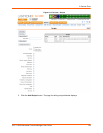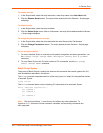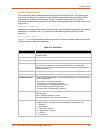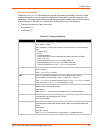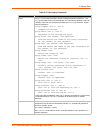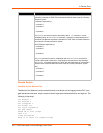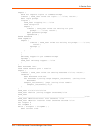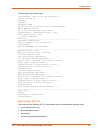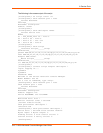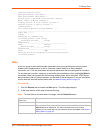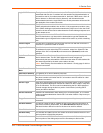
8: Device Ports
SLC™ 8000 Advanced Console Manager User Guide 143
Table 8-18 Secondary Commands
Command Description
string
The
string command provides a series of string manipulation operations. The
string command will only be used with the set command to generate a value for
a variable. There are nine operations provided by the
string command. Syntax
(varies by operation):
string compare <str 1> <str 2>
Compare two strings
string match <str 1> <str 2>
Determine if two strings are equal
string first <str needle> <str haystack>
Find and return the index of the first occurrence
of 'str_needle' in 'str_haystack'
string last <str needle> <str haystack>
Find and return the index of the last occurrence of
'str_needle' in 'str_haystack'
string length <str>
Return the length of 'str'
string index <str> <int>
Return the character located at position 'int' in
'str'
string range <str> <int start> <int end>
Return a string consisting of the characters in
'str' between 'int start' and 'int end'
string tolower <str>
Convert <str> to lowercase
string toupper <str>
Convert <str> to uppercase
string trim <str 1> <str 2>
Trim 'str 2' from 'str 1'
string trimleft <str 1> <str 2>
Trim 'str 2' from the beginning of 'str 1'
string trimright <str 1> <str 2>
Trim 'str 2' from the end of 'str 1'
In each of the above operations, each <str *> element can either be a quoted string
or a variable reference. The <int *> elements will be either words or variable
references.
expr
This command evaluates an arithmetic expression and returns the result. The expr
command will only be used in combination with the
set command to generate a
value for a variable. Syntax:
expr <value> <operation> <value>
Each
<value> will be either a word or a variable reference, and <operation> an
arithmetic operation.




